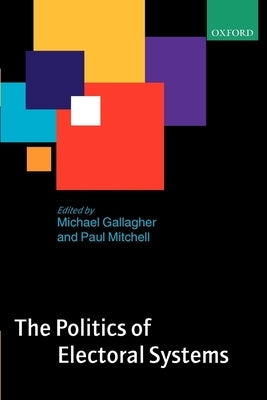1
/
of
1
Oxford University Press, USA
The Politics of Electoral Systems
The Politics of Electoral Systems
Regular price
$61.00 USD
Regular price
Sale price
$61.00 USD
Shipping calculated at checkout.
Quantity
Couldn't load pickup availability
Electoral systems matter. They are a crucial link in the chain connecting the preferences of citizens to the policy choices made by governments. They are chosen by political actors and, once in existence, have political consequences for those actors. They are an important object of study for
anyone interested in the political process. This book is a systematic analysis of electoral systems. In addition to comparative chapters, the book contains full accounts of the operation of electoral systems in 22 countries: in addition to 11 from Western Europe, the book includes: Hungary, Russia, Australia, Canada, India, the USA, Japan, New Zealand, Israel, Chile and South Africa. The book provides detailed analyses of the operation of a diverse set of electoral systems in their national context. Each chapter explains how the electoral system really works in the given country, examining the strategic incentives the system provides to voters, candidates, and parties. All
country chapters have a common format and structure. Successive sections analyze: the institutional context; how each electoral system was chosen historically; how the current electoral system operates (the rules, mechanics, and ballot structure); and the political consequences of the current system
(the impact on the party system, the internal life of parties, and the impact on parliament and government formation). Each country chapter then contains a final section which focuses on the politicization of electoral institutions. In recent years many countries have changed their electoral
systems, either entirely or in part so there is a strong focus on the processes of electoral reform, both historically and prospectively. The book concentrates on the real world 'politics', as well as the 'political science' of electoral systems. The book will be of interest to those concerned with the practical political business of electoral reform. The book contains a wealth of evidence about the performance of various kinds of proportional representation and of non-PR systems. This will be invaluable for anyone interested in the
question: 'What would be the best electoral system for my country?
Author: Michael Gallagher
Publisher: Oxford University Press, USA
Published: 03/23/2008
Pages: 688
Binding Type: Paperback
Weight: 2.31lbs
Size: 9.15h x 6.22w x 1.48d
ISBN: 9780199238675
anyone interested in the political process. This book is a systematic analysis of electoral systems. In addition to comparative chapters, the book contains full accounts of the operation of electoral systems in 22 countries: in addition to 11 from Western Europe, the book includes: Hungary, Russia, Australia, Canada, India, the USA, Japan, New Zealand, Israel, Chile and South Africa. The book provides detailed analyses of the operation of a diverse set of electoral systems in their national context. Each chapter explains how the electoral system really works in the given country, examining the strategic incentives the system provides to voters, candidates, and parties. All
country chapters have a common format and structure. Successive sections analyze: the institutional context; how each electoral system was chosen historically; how the current electoral system operates (the rules, mechanics, and ballot structure); and the political consequences of the current system
(the impact on the party system, the internal life of parties, and the impact on parliament and government formation). Each country chapter then contains a final section which focuses on the politicization of electoral institutions. In recent years many countries have changed their electoral
systems, either entirely or in part so there is a strong focus on the processes of electoral reform, both historically and prospectively. The book concentrates on the real world 'politics', as well as the 'political science' of electoral systems. The book will be of interest to those concerned with the practical political business of electoral reform. The book contains a wealth of evidence about the performance of various kinds of proportional representation and of non-PR systems. This will be invaluable for anyone interested in the
question: 'What would be the best electoral system for my country?
Author: Michael Gallagher
Publisher: Oxford University Press, USA
Published: 03/23/2008
Pages: 688
Binding Type: Paperback
Weight: 2.31lbs
Size: 9.15h x 6.22w x 1.48d
ISBN: 9780199238675
About the Author
Michael Gallagher is Professor of Comparative Politics at Trinity College, University of Dublin. He has also been a visiting Professor at New York University and at City University of Hong Kong. His research has covered various aspects of elections, electoral systems and political parties in a comparative context.
This title is not returnable
Share


